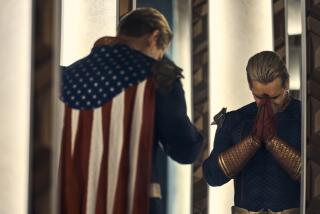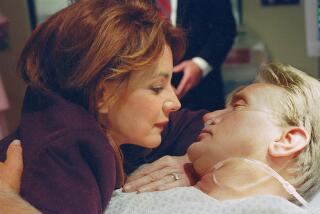‘Homeland’ plots a course not all ready to follow
In its first season, “Homeland” hinged on the premise that Marine Sgt. Nicholas Brody (Damian Lewis) had been turned while held captive by Al Qaeda and, now back in the States, was planning a terrorist attack. Nobody believed that war hero Brody would be capable of such a betrayal, save for bipolar CIA officer Carrie Mathison (Claire Danes).
Brody’s plan depended on his partnership with another turned Marine, Tom Walker, a plot point, it turns out, that producers Alex Gansa and Howard Gordon never liked and, to this day, would rework if given the chance — provided they could come up with something a little more plausible.
“The idea that two Marines were turned ... it just stuck in our craws,” Gansa says. “Nobody ever pointed it out as underbaked, which I just said, ‘Whew. We dodged a bullet with that one.’”
STORY: Some timely intel on ‘Homeland’
“Homeland” won the Emmy for drama series and top prizes for its leads, Danes and Lewis. A week after that haul, its second season premiered and, well, the show runners didn’t quite sidestep the shots this time around. (Warning: If, somehow, you still haven’t watched “Homeland’s” second season, stop reading. Now.)
Whether it was Brody texting terrorist Abu Nazir in the middle of an assassination attempt or Brody helping kill the vice president by zapping his pacemaker or Nazir somehow being able to enter the United States and eventually kidnap Carrie, “Homeland’s” sins of plausibility were much cataloged and debated. Midway through just its second season, even as its audience kept growing, some critics were openly wondering if the show had already jumped the shark.
“I can understand how some people might think that we got a little plotty and a little too ‘24’ at the end,” says show runner Gansa, who, yes, worked on the Keifer Sutherland hit series “24” with Gordon. “We had some big moves we needed to make, and two of them were killing Abu Nazir and the vice president. That had to happen in order for a happy ending between Carrie and Brody to be possible.”
WATCH: The Envelope Emmy Round Table | Drama
That endpoint, where Carrie and Brody could contemplate a life together, was always the season’s planned destination, even though it was such a far-fetched notion in itself that Gansa says audiences were correct to wonder “What are they smoking?” as they watched it play out in the season finale.
In fact, some say “Homeland” would have been better off dispatching Brody at the end of Season 1, an idea that Gansa summarily rejects.
“Not killing him off was the right move,” Gansa says. “There was still more story to tell between Carrie and Brody. I have no regrets about that.”
The show’s expanded audience, Gansa says, tells him the needle was pointing in the right direction, though he isn’t completely without regrets. (He admits the season’s hit-and-run accident subplot involving Brody’s daughter, Dana, and the vice president’s son didn’t “accomplish all the things we hoped it would.”)
TIMELINE: Emmy winners through the years
But Gansa says the carpers who couldn’t get past small details like Nazir’s infamous BlackBerry Skype call may be getting a little too bogged down in the details.
“Whether it’s Brody and the vice president or Carrie and Nazir, we’ll always sacrifice a degree of believability in order to put two characters together in a dramatic way,” Gansa says. “We could have killed the vice president outside of Brody’s company, but that wouldn’t have been as fun.”
“The great thing about the fan response,” Gansa continues, “is that everybody has a different theory about just about every aspect of the show. My wife is still convinced that Brody knew the bomb was in the car [in the season finale].”
Said wife, Gansa adds with a laugh, is absolutely, unequivocally wrong.
More to Read
The complete guide to home viewing
Get Screen Gab for everything about the TV shows and streaming movies everyone’s talking about.
You may occasionally receive promotional content from the Los Angeles Times.







